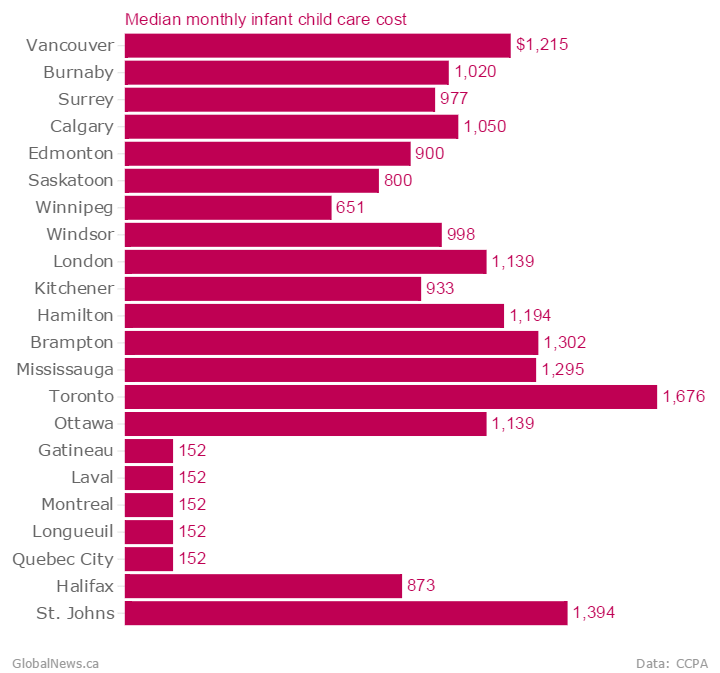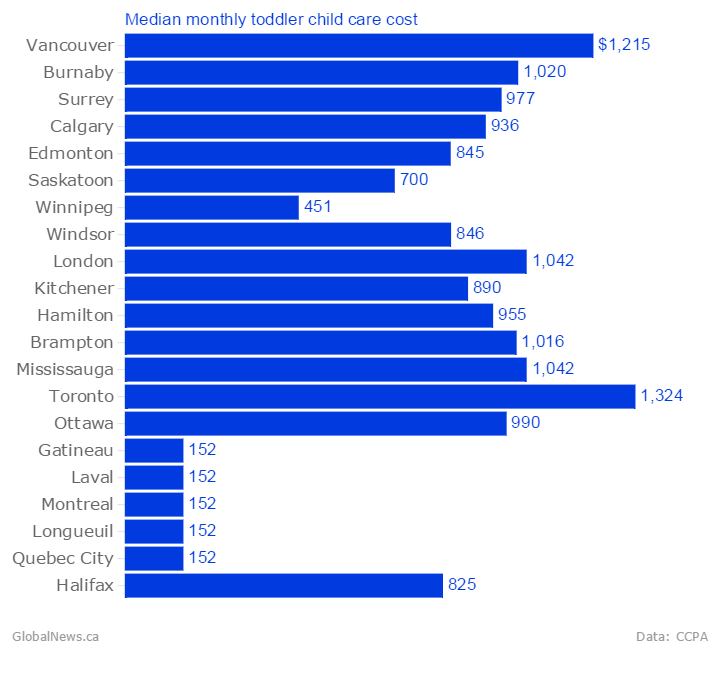WATCH ABOVE: Tom Mulcair says an NDP government would create a million daycare spaces across the country for no more than $15 dollars a day. But how will they pay for it. Vassy Kapelos has an election campaign reality check.

$15-a-day child care has been NDP leader Thomas Mulcair’s most prominent platform plank. He was promoting it again against a backdrop of parents and squirming kids in Vancouver Thursday.
“In British Columbia there are regulated childcare spaces available for only 18 per cent of children under the age of six,” he said. “My plan is for a million $15-a-day childcare spaces throughout the country and that will mean 110,000 spaces across British Columbia.”
Mulcair has said he plans to raise corporate taxes and scrap income splitting in order to pay for the $5-billion promise, but hasn’t said how much those two moves will generate for childcare.
Here’s what else we know so far.
It’s not universal
The NDP’s plan is to create a million childcare spaces at a maximum cost of $15 a day.
When asked if Mulcair could guarantee a childcare space for every child in Canada, he said Thursday, “that’s the goal. One million spaces of maximum $15 a day.”
WATCH: Mulcair discusses cost and effectiveness of childcare plan.
According to the NDP, there are currently 500,000 kids who have regulated childcare and 800,000 who don’t. A million spots at $15-a-day would still leave up to 300,000 kids with childcare costing more than the NDP’s maximum.
It’s not immediate
By the end of their first term (2018-2019), the NDP’s plan would create just 370,000 spaces at a cost of $1.86 billion.

You only get the million spots if you re-elect them. The $5-billion plan won’t be fully implemented until 2023.
It’d be run by the provinces
Childcare is a provincial responsibility and the NDP doesn’t plan to change that. So provincial buy-in is necessary if their plan is to be anything but a policy paper.
“Any province that would refuse money for childcare I think would probably come up against some pretty angry parents,” NDP campaigner Brad Lavigne said in an interview.
WATCH: NDP leader Thomas Mulcair was in Vancouver Thursday morning to tout his Affordable Childcare Plan that he claims would greatly increase the amount of regulated daycare spots in provinces like British Columbia.
The NDP plan involves giving provinces the funding to either create new spaces, or lower the cost of existing spaces to $15 a day.
Some provinces are willing to play ball. British Columbia, Manitoba and New Brunswick all said they’d be willing to negotiate with any party on a national daycare plan.
The Ontario government said in a statement it “welcomes and encourages a national discussion and interest from all federal parties on childcare, a position that was communicated to all federal leaders coming out of the Council of the Federation.”
Quebec, which has its own daycare program, declined to comment.
What does daycare cost now?
A lot. According to the Canadian Centre for Policy Alternatives, Torontonians pay the most in Canada for childcare – the median cost is $1,676 each month.
Quebec, which developed the $15-a-day plan the NDP is basing their policy on, has the lowest costs in the country, with a median of $152 each month.
Of course, if parents don’t pay, taxpayers do: hasn’t revealed in detail how it would fully pay for the million spaces, public spending on childcare is the highest in Quebec at $5,958 for every regulated space. Ontario, where people pay the most for childcare, pays just $2,952 per regulated space. The New Brunswick government, at just $1,613 per regulated space, pays the least.
Would it help the economy?
The $15-a-day childcare plan made money in Quebec, according to a study from University of Sherbrooke economist Pierre Fortin. Fortin found the provincial childcare plan motivated 70,000 more mothers to find jobs – increasing the number of women in the workforce by 3.8 per cent.
The study went on to suggest that as a result, the province’s GDP rose by nearly $5 billion, more than covering the cost of the program.
But the same study shows the cost of the program has ballooned from $300 million in 1997-1998 to $2.2 billion in 2011-2012.
“In Quebec, what we’ve seen is that the costs have exploded. At the beginning of the program in 1997, the cost was about $300 million a year, now it’s closer to $2.6 billion. And in the meantime, what we see is the cost per child has more than doubled. So it’s very expensive as a system,” Yanick Labreie, an economist at the Montreal Economic Institute, said in an interview Thursday.
“In the meantime, if the benefits were there, we wouldn’t be complaining about the program. But the program is simply not universal; there are a lot of waiting lists for children.”
Labrieie should know: He’s been on a waitlist for a daycare space for seven years, he said. And he argues the program benefits wealthy families at the expense of poorer ones by not restricting spaces based on income.
Instead, Labreie suggests a subsidy given directly to low-income families would allow them to seek out their own childcare.
“Targeted subsidies … are always better, because they can, after that, use those subsidies to go and have some choice in the market. And we would achieve the same result,” he said, suggesting a direct subsidy would still allow more women to enter the workforce.
What the other parties say
The Liberals agree an income-tested subsidy would be better.
“Thomas Mulcair talks a good game about childcare, but his plan doesn’t back him up. Even the NDP admits their program will take eight years to rollout, in the best-case scenario. It is not income-tested, meaning the NDP would give the largest benefit to high-income parents,” Chrystia Freeland, the Liberal candidate for the Toronto riding of University-Rosedale, said in a statement.
“A Liberal government will create a bigger, tax-free, monthly child benefit to help parents with the high cost of raising their kids, immediately lifting 315,000 children out of poverty.”
The Conservatives, on the other hand, suggest their Universal Child Care Benefit cheques are a better option. This gives all parents, regardless of income, $160 a month.
“We believe in giving parents the choice in how to raise their children, not giving billions of dollars to the bureaucracy. Thomas Mulcair and the NDP have consistently opposed the Universal Child Care Benefit (UCCB) cheques. They voted against the UCCB’s creation, and they voted against the UCCB enhancement,” Conservative MP Kerry-Lynne Findlay said in a statement.
– With files from Bryan Mullan and Vassy Kapelos





Comments